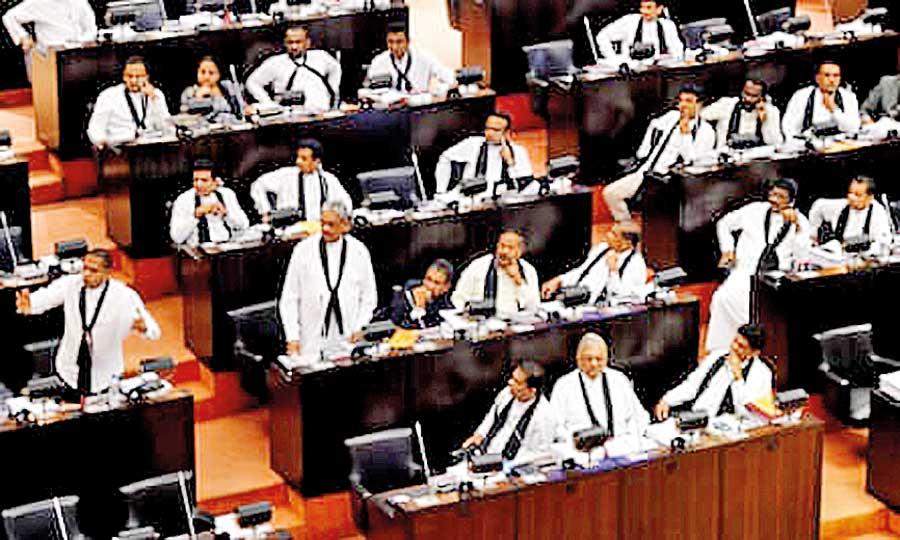11 Dec 2020 - {{hitsCtrl.values.hits}}

One year and an ongoing pandemic later, the dust seems to have settled and the euphoria seems to have  subsided. Much has been achieved, but much remains to be achieved. Much has been put into action, but much remains limited to paper. People are desperate.
subsided. Much has been achieved, but much remains to be achieved. Much has been put into action, but much remains limited to paper. People are desperate.
The first coronavirus wave left them reeling; in its efficient handling of the contagion the government proved itself capable of deploying its civilian and military personnel to combat the virus. It promised it would keep things under control. It did. Voters responded by giving it a two-thirds majority. The second wave, by contrast, is more virulent. Whether or not this means the public have lost faith in those governing remains to be seen. We have four more years to go to see that. Elections should be the last concern now anyway.
"The moral of the story is that floating voters, particularly the young, who will become a formidable electoral force by 2024, will not be moved by online activism if it exists in the moment and does not go beyond"
Two weeks ago President Gotabaya Rajapaksa completed his first term in office, Prime Minister Mahinda Rajapaksa celebrated his 75th birthday and the administration put together its first real Budget. Meanwhile on social media, a concerted campaign led if not funded (the jury’s still out there) by anti-government elements charged, in Goebbelsian fashion, that the regime had failed. Except for a notice issued by the CID to a Jathika Hela Urumaya Councillor over a controversial (yet unedited) image shared on Facebook, the “Gota Fail” campaign did not provoke a strong response or backlash from the government, probably because it had more important things to attend to, like the pandemic. “Gota Fail” hence, predictably, faded away; the critics had relatively little to pick or stand on.
Criticism of this sort could only lead to three outcomes. One, the government ignores it, depriving its critics of an impetus through which they can grill it further. Two, it lingers there only in the passing moment, provoking likes and shares, but never going beyond.
Three, and most importantly, upon it sizzling and fading away, the critics lose much of their audience, particularly if the Opposition from which the campaign emerged reveals its own credibility gap. Barely three four days after “Gota Fail” trended on Facebook, the Opposition held a news conference at which an MP bit on some raw fish. Dilip Wedaarachchi made a very valid point, yet the manner in which he made it undid the campaign; unlike the latter, this one went abroad, from The Indian Express to The Telegraph.
 In the absence of concrete evidence, criticism thus gets mired in an echo chamber. It offers no alternative, only anger. And as the Wedaarachchi episode demonstrates only too well, any gains that the critics make, at least in social media circles, will be reversed the moment the Opposition shows itself to be as unorganised and chaotic as
In the absence of concrete evidence, criticism thus gets mired in an echo chamber. It offers no alternative, only anger. And as the Wedaarachchi episode demonstrates only too well, any gains that the critics make, at least in social media circles, will be reversed the moment the Opposition shows itself to be as unorganised and chaotic as
the government.
People are angry at the government. But anger at the government doesn’t necessarily translate into support for the Opposition. There are two reasons for this.
One, much of the vote that went to Gotabaya Rajapaksa last year and his party last August was rooted in the fury against the previous regime’s lackadaisical attitude, not just to security, but also the economy. It does not take a fervent anti-yahapalanist to point out that MPs who are busy questioning the handling of the economy by this government went suspiciously quiet over its mishandling by the government they had become a part of. Obviously, people will be willing to give the incumbent the benefit of the doubt, given that it’s been only one year, and the previous fellows, for all their talk, had four full years of unmitigated disaster to show for it. No social media activism is going to compensate for that.
Two, and more importantly the sort of anger that is now mounting against the government have cut across party lines. Issues like the Wilpattu controversy and the Easter attacks did not shore up support for Gotabaya Rajapaksa on the strength of the people’s anger alone. The floating voters who went to Rajapaksa did so mainly because they viewed him as a non-politician, a maverick who had never been in parliament before. They were tired by the lies they had been chomping on since 2015, lies propagated mostly on social media.
" Unlike the previous regime, which laid the blame for almost all its failings on the doorstep of its predecessors, the current administration is not censuring the yahapalanists for its shortcomings in a major way"
The moral of the story is that floating voters, particularly the young, who will become a formidable electoral force by 2024, will not be moved by online activism if it exists in the moment and does not go beyond. In 2015, social media was not the potpourri of opinions and factoids in Sri Lanka that it has become today, which explains why people were taken in by what they saw online then. Regurgitating the anti-government line now, however, will be seen to be as self-serving as State propaganda. There is little difference between the two. The SJB must realise that and realise it cannot win through this method alone.
So here’s where the government seems to be succeeding, for now. Unlike the previous regime, which laid the blame for almost all its failings on the doorstep of its predecessors, the current administration is not censuring the yahapalanists for its shortcomings in a major way. Opposition MPs may, for instance, call the recent Budget uninspiring (whatever that means), yet the government is not responding to these MPs like the latter did when they were in power and the current administration was in the Opposition. In other words the government is not passing the buck. The Opposition is dishing out criticism after criticism, but the incumbent is not returning the ball like the fellows before him did.
This, however, is not a strength: if the government is to respond properly to criticism, particularly unfounded criticism, it must make use, not of extra-judicial bodies that belong less to democracies than to totalitarian states, but of the media, the cabinet spokesperson, if not an official tasked with answering questions, resolving doubts, and clarifying matters. That the yahapalanists had no proper PR arm is what contributed to their downfall, we know. The incumbent can only repeat that mistake risking electoral defeat in 2024.
27 Nov 2024 1 hours ago
27 Nov 2024 3 hours ago
27 Nov 2024 4 hours ago
27 Nov 2024 4 hours ago
27 Nov 2024 4 hours ago